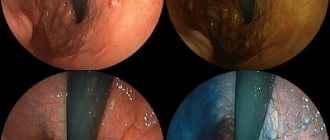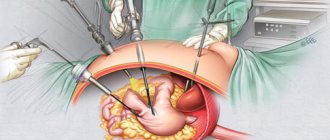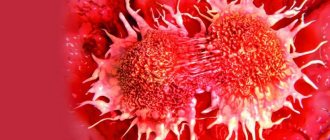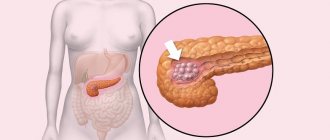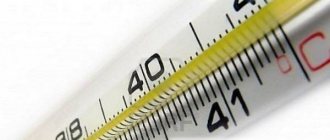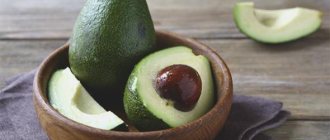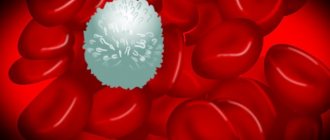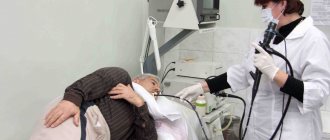The stomach is an indicator of stress
The mechanism of development of peptic ulcer disease is triggered by the nervous system.
As a rule, a gloomy subject who is in constant stress and does not know how to get along with himself or with the world around him has a much greater chance of getting an ulcer than a cheerful optimist whose lifestyle is far from perfect. The gastrointestinal tract is the first to respond to stress. If you get nervous, your stomach hurts or, worse, before exams or an important meeting you have to run to the toilet every five minutes. The physiological reactions that occur in the body during stress are associated with the release of adrenaline, which constricts blood vessels. First of all, the mucous membranes suffer, because vascular spasm impedes blood circulation. As a result, the nutrition of the cells of the mucous membrane is disrupted.
https://www.youtube.com/watch?v=https:accounts.google.comServiceLogin
Gradually, the cells of the stomach (or duodenum) partially atrophy and die, and in their place an ulceration forms. If the ulcer is not treated, the inflammation spreads to the deeper layers of the mucosa, and large vessels are exposed. It can all end in bleeding or even perforation of the ulcer - the formation of a hole in the wall of the stomach or duodenum. An ulcer must be diagnosed promptly and treated correctly.
Disease of the young and active
In addition to the characteristics of the nervous system, a person’s attitude towards life and his ability to respond to stress, there are many other factors that increase the chances of becoming a victim of a peptic ulcer.
Age. Ulcer is a disease of people of the most active age (25-40 years). Duodenal ulcers most often occur at the age of 20-30 years, gastric ulcers - usually after 35 years.
Constitutional predisposition. Ulcers of the stomach and duodenum often develop in people of tall stature and asthenic, thin-boned physique, with a choleric temperament. But body features do not play a leading role, because a predisposition develops into a disease only with a confluence of unfavorable factors.
Poor nutrition. The mucous membrane of the stomach does not like very spicy, sour and salty foods, as well as too coarse fiber. Regarding fiber, it is worth noting that it is vitally important and it is absolutely impossible to remove it from the diet, with the exception of the period of exacerbation of a peptic ulcer (fiber will irritate the inflamed mucous membrane).
Uncontrolled medication use. Ulcers are most often provoked by so-called non-steroidal anti-inflammatory drugs. This is a fairly large group of medications - they are taken for various inflammatory diseases. In this case, medical supervision is required, since the drug can very quickly provoke the development of a peptic ulcer, literally out of the blue.
Bacteria. Not long ago, scientists isolated the bacterium helicobacter pylori, which is found in the mucous membrane of the stomach and duodenum in 80% of cases of peptic ulcer. Currently, there is no consensus in the medical community whether this bacterium is the root cause of the ulcer or plays a secondary role.
What are the consequences of gastritis?
The body has a powerful ability to regenerate damaged tissue, but its resources are not limitless. If a person has ignored the signs of the disease for years, sooner or later the acid in the stomach can completely burn through the mucous membrane, affecting the muscle layer of the organ. If in this case the patient is not provided with emergency medical care, there is a high probability of death.
A person may face a number of situations when the serious consequences of the disease become a threat to his health and life.
Some destructive processes may be irreversible even after emergency surgery, as a result of which doctors are often forced to make a disappointing life prognosis.
If not treated...
When a person encounters the symptoms of a peptic ulcer for the first time, there is a great temptation to self-medicate. But this is an extremely reckless approach, since you can independently eliminate the symptoms, but not the causes of the disease. If the first signs of a peptic ulcer occur, you should consult a specialist, since delay can lead to serious health consequences.
An ulcer can grow into the wall of the stomach and damage blood vessels, thereby causing internal bleeding. The defect can also spread to neighboring organs and cause their damage - penetration. In addition, an ulcer can lead to a breakthrough into the abdominal cavity - perforation and inflammation of the peritoneum - peritonitis.
Treatment methods
Drug therapy
You can live with a stomach ulcer if you follow the recommendations of a gastroenterologist. Factors that contribute to recovery are diet and healthy sleep. In treatment, a positive result can be achieved by using complex therapy, including medications, which are presented in the table:
Indications for surgery
In rare cases, ulcers cannot be cured with therapy alone. The operation is performed if there are no expected results from drug treatment or there is a high risk of complications caused by taking medications. The ability to work is maintained, but it is not advisable to work in industries that limit the ability to eat regularly, and excessive physical and emotional stress should be avoided.
Detect in time!
Peptic ulcer disease is diagnosed based on complaints. It is extremely rare for an ulcer to appear suddenly - usually some discomfort is present long before ulceration develops. Erosive gastritis (inflammation of the stomach) or duodenitis (inflammation of the duodenum) can be treated and will never develop into an ulcer. In order to diagnose them in time, you should consult a doctor at the first discomfort or pain.
Traditional complaints for peptic ulcer disease: quite strong, sometimes sharp and piercing pain in the epigastric region, in the right hypochondrium. As a rule, they occur on an empty stomach and at night, sometimes 40-60 minutes after eating or immediately. The patient looks pale, generally feels unwell, and feels weak. Most often, the patient is apathetic, his general interest in life is significantly reduced, and he has no appetite.
To confirm the diagnosis, fibroesophagogastroduodenoscopy (FEGDS) or radiography is done, which is used quite rarely. The patient drinks barium, then an x-ray is taken; the image clearly shows the condition of the mucous membranes. With FEGDS (this is a very accurate study), a probe is inserted into the stomach, and using a fibrogastroscope, the doctor directly sees the mucous membrane of the stomach or duodenum. At the same time, you can take a biopsy and test for Helicobacter.
https://www.youtube.com/watch?v=ytabout
After the advent of FEGDS, the number of cases of the disease increased sharply, which suggests that previously peptic ulcer disease was often simply not diagnosed. A man lived with an ulcer and was sure that he had, at most, gastritis, and sudden gastric bleeding could come as a bolt from the blue. In case of gastric bleeding or “vomiting coffee grounds”, the patient is urgently operated on - the ulcer threatens the patient’s life, because the next stage will be a perforation of the stomach.
The main signs of the disease: how to understand that it is an ulcer
An ulcer is a chronic disease. People whose relatives, even distant ones, once suffered from diseases associated with this organ are at greater risk. It is important to know the signs that help a sick person see the need to see a doctor.
Firstly, the disease manifests itself in different ways. For example, the first patient feels severe pain in the abdominal area, but for the second, such sensations will be a subtle hindrance. Secondly, you need to understand the essence of the disease. An ulcer forms when the body cannot cope with the mucus produced by an organ. There is a conflict between the protective mechanism of the stomach and aggressive factors.
Thirdly, such a development of the disease leads to severe pain, loss of appetite, and general weakness, which affects the person’s condition. How dangerous are the listed signs? Is it possible to die from a stomach ulcer?
Choose soups and cereals
After the diagnosis of “ulcer” is confirmed, the patient is first prescribed a diet - the so-called table No. 1. All food is consumed exclusively in boiled, steamed and pureed form. These are slimy cereal soups, pureed porridge, white crackers. For one to two weeks, a person eats exclusively mucous decoctions, then the diet is expanded.
All vegetables should be consumed boiled. Meat, fish, eggs - as the main sources of protein - are vital, since protein foods help the body recover. Such a menu is very gentle; for example, allergy sufferers have much stricter dietary restrictions. This diet is followed for years, until the ulcer heals completely.
help yourself
— First of all, it is necessary to get rid of bad habits, especially smoking and alcohol abuse, which contribute to inflammation of the stomach wall.
- Enjoy life. Emotional stress increases the production of hydrochloric acid.
— For peptic ulcers, a special diet is indicated. Diet for ulcers
— Spend more time in the fresh air, although heavy physical activity should be avoided.
- You should refrain from taking non-steroidal anti-inflammatory drugs, especially aspirin. If this is not possible, it makes sense to consult a doctor about what other drug can replace it.
— In old age, it is necessary to prevent and treat atherosclerosis, in which blockage of the vessels supplying the stomach and duodenum occurs.
Classification
Let's start with chronic gastritis. It develops as a result of lack of treatment and timely prevention. Symptoms occur rarely and last for several days, after which they subside. Chronic gastritis is called inflammatory processes affecting the gastric mucosa. There is a possibility of relapse, that is, exacerbation. They can be triggered by various factors, including poor diet, alcohol abuse, etc.
Gastritis is classified according to the principle A, B, C.
- B. The most common type of chronic gastritis. This is a bacterial form caused by Helicobacter bacteria. Under normal conditions, the gastric environment is acidic. To prevent the walls from digesting themselves, nature came up with protection in the form of a layer of mucus and the release of dosed acid. But when a bacterium enters the body, the acid is neutralized. As a result, the acid-base balance is disturbed and the environment becomes more alkaline. Reflexes are triggered and more hydrochloric acid is released. An excess of it is formed, from which thick mucus can no longer protect. This is the principle of how bacteria work in type B gastritis.
- C. Chemical form of chronic gastritis. Type C occurs when the gastric walls are exposed to aggressive substances. Those at greatest risk of getting sick are those who drink alcohol, soda, have problems with kidney failure, take medications uncontrollably, etc.
- A. This type includes the autoimmune type of disease. It is the rarest among those presented. It is due to the fact that the human immune system reprograms its work and ultimately considers the cells of the gastric walls to be dangerous and harmful. An attack on them begins, followed by the development of gastritis.
But the form of gastritis can be mixed. It is not uncommon for two types of chronic disease to be diagnosed simultaneously.
Protection from aggression
Two factors play a leading role in the occurrence of peptic ulcers: increased aggressive factors and weakened protective functions. The stomach secretes mucus - it protects its mucous membrane from the harmful effects of pepsin and hydrochloric acid, which are necessary for digesting food. In addition, to neutralize the acidic environment, the gastric mucosa produces some alkalis.
https://www.youtube.com/watch?v=user1MGMUplaylists
Accordingly, in order to cure a peptic ulcer, it is necessary to weaken aggression and strengthen defense. In addition to diet, the patient is prescribed medications to reduce acidity. Many self-medicate and drink soda - it gives a quick but deceptive effect, provoking even greater damage to the tissues of the mucous membrane of the stomach and duodenum.
Modern drugs for the treatment of ulcers do not just reduce the acidity of gastric juice - they work at the level of the cell that produces hydrochloric acid (omez, etc.). The intensity of acid intake decreases, even the level of sodium ions in gastric juice drops. Special antibacterial agents are aimed at combating helicobacter pylori. If we are talking about a duodenal ulcer, medications are prescribed to reduce the aggressiveness of the secreted bile.
Diagnosis of a burst ulcer
A perforated gastric ulcer should be differentiated from the following diseases:
- stomach phlegmon;
- oncological malignant neoplasms in the gastric wall;
- myocardial infarction;
- disorders of mesenteric circulation;
- pleurisy and pneumonia;
- rupture of an abdominal aortic aneurysm.
To clarify the diagnosis, the doctor prescribes diagnostics (x-ray examination of the peritoneum, endoscopic examination, ultrasound, laboratory tests, laparoscopy and other methods).
What is the difference?
Ulcers of the stomach and duodenum are similar in many ways. In both cases, this is inflammation and disruption of the integrity of the mucous membrane of the affected organ. But there are differences in sensations. With a duodenal ulcer, the pain is usually very severe. It often occurs on an empty stomach or, conversely, 1.5-3 hours after eating, as well as at night or early in the morning and goes away after eating or alkaline mineral water.
In case of vomiting “coffee grounds” or blood, immediately call an ambulance, and until it arrives, lay the patient on his side and do not allow him to move. Place an ice pack on the stomach area. Under no circumstances should you eat or drink!
For those who don't like medications
- Boil the peeled potatoes, drain the water. Take half a glass of warm decoction 3 times a day before meals.
- 2 tbsp. spoons of dry licorice root, pour 0.5 liters of boiled water, cook for 10 minutes over low heat, leave for about 2 hours. Take ¼ cup 3 times a day.
- For 20 days, three times a day, an hour before meals, take 40-60 drops of 20% propolis tincture.
- 3 tbsp. Add 0.5 liters of cold water to spoons of dry crushed plantain leaves, bring to a boil and simmer over low heat for 10 minutes. Leave for an hour, drink 1/3 glass 3 times a day half an hour before meals.
- 1 tbsp. Dissolve a spoonful of honey in a glass of warm boiled water and drink one and a half hours before meals or 3 hours after meals.
Not so long ago it was believed that milk was beneficial for peptic ulcers. Modern doctors do not recommend that people with ulcers eat this product, since it increases the acidity of gastric juice even in completely healthy people.
